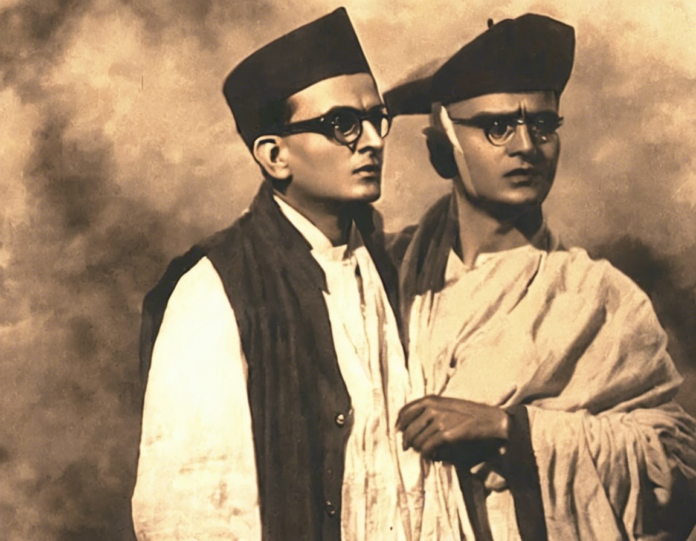Hailed as a visionary, freedom fighter, poet, and ideologue, Veer Savarkar continues to evoke strong emotions and opinions in Indian society even decades after his passing. While he is often considered a controversial figure, there is no denying the impact he had on Indian independence and the nationalist movement. Recently, the announcement of a cinematic tribute to this enigmatic personality has sparked fresh debates and discussions surrounding his life and legacy.
Who was Veer Savarkar?
Veer Savarkar, born as Vinayak Damodar Savarkar in 1883, was a prominent figure in India’s struggle for independence from British colonial rule. He was a fierce advocate of Hindutva, a term he popularized, which emphasizes the cultural and religious unity of Hindus. Savarkar was also a prolific writer and poet, contributing significantly to the literature of the time.
The Controversies Surrounding Savarkar
Savarkar’s legacy is mired in controversies, primarily due to his association with revolutionary activities, his incarceration in the infamous Cellular Jail in the Andaman and Nicobar Islands, and his alleged involvement in the assassination of Mahatma Gandhi. While he was acquitted of any direct involvement in the assassination, his ideological stance and political affiliations continue to divide opinions.
Cinematic Portrayal: Unveiling a Complex Persona
The decision to make a film on Veer Savarkar’s life opens up a new chapter in bringing his story to a wider audience. Cinematic portrayals have the power to humanize historical figures, showcasing their complexities, struggles, and motivations. By delving into Savarkar’s life story, the film has the potential to shed light on lesser-known aspects of his persona and the turbulent times in which he lived.
Challenges and Criticisms
The cinematic tribute to Veer Savarkar is not without its share of challenges and criticisms. Critics argue that glorifying a figure like Savarkar, whose legacy is intertwined with contentious issues, could lead to glorification or distortion of historical facts. Balancing the portrayal of a nationalist icon with the controversies surrounding his life will be a delicate tightrope for the filmmakers.
Analyzing Savarkar’s Ideologies
A critical aspect that the film could explore is Savarkar’s ideological beliefs, including his advocacy for Hindutva, his views on nationalism, and his approach towards social and political reforms. Understanding the evolution of his thoughts and the impact of his writings on contemporary politics can provide valuable insights into the complexities of his character.
Legacy and Impact
Veer Savarkar’s legacy continues to cast a long shadow on Indian society and politics. While some view him as a patriot who stood up against colonial oppression, others criticize his divisive rhetoric and alleged role in fomenting communal tensions. The film on his life has the potential to reignite discussions on his contributions to India’s freedom struggle and his lasting impact on the nationalist movement.
Commemorating a Complex Figure
In conclusion, the cinematic tribute to Veer Savarkar represents an opportunity to commemorate a figure who remains a subject of fascination and debate in Indian history. By presenting a nuanced portrayal of his life, the film can invite audiences to engage critically with his legacy, ideologies, and contributions to the independence movement. In a diverse and pluralistic society like India, acknowledging the complexities of historical figures like Savarkar is essential for a more nuanced understanding of the past.
Frequently Asked Questions (FAQs)
-
Was Veer Savarkar a freedom fighter?
Yes, Veer Savarkar was a prominent freedom fighter who played a significant role in India’s struggle for independence from British rule. -
What is Hindutva, and how did Savarkar contribute to its ideology?
Hindutva is a term that emphasizes the cultural and religious unity of Hindus. Savarkar played a key role in popularizing this ideology through his writings and speeches. -
What controversies surround Veer Savarkar’s legacy?
Savarkar’s legacy is controversial due to his involvement in revolutionary activities, his incarceration in Cellular Jail, and his alleged connection to Mahatma Gandhi’s assassination. -
Why is the cinematic tribute to Veer Savarkar generating debate?
The film on Veer Savarkar has sparked debate due to the complex nature of his legacy and the challenges of balancing historical accuracy with a nuanced portrayal. -
What can audiences expect from the cinematic portrayal of Veer Savarkar’s life?
Audiences can expect a comprehensive look at Savarkar’s life, including his contributions to the freedom struggle, his ideological beliefs, and the controversies surrounding him. -
How has Veer Savarkar influenced Indian politics and society post-independence?
Veer Savarkar’s ideologies have had a lasting impact on Indian politics, particularly in shaping debates around nationalism, religion, and cultural identity. -
What are some key themes that the film on Veer Savarkar could explore?
The film could delve into themes such as nationalism, freedom struggle, Hindutva ideology, political activism, and the complexities of historical figures. -
What are the challenges faced by filmmakers in portraying a controversial figure like Savarkar?
Filmmakers face the challenge of navigating the fine line between portraying Savarkar as a nationalist icon and addressing the controversies and criticisms surrounding his life. -
How can the cinematic tribute to Veer Savarkar contribute to historical discourse and understanding?
The film can contribute to historical discourse by presenting a balanced and nuanced portrayal of Savarkar, encouraging audiences to critically engage with his life and legacy. -
What role did Savarkar play in shaping the narrative of Indian independence and nationhood?
Veer Savarkar’s contributions to Indian independence, his writings on nationalism, and his advocacy for Hindutva have played a significant role in shaping the narrative of Indian nationhood and identity.
